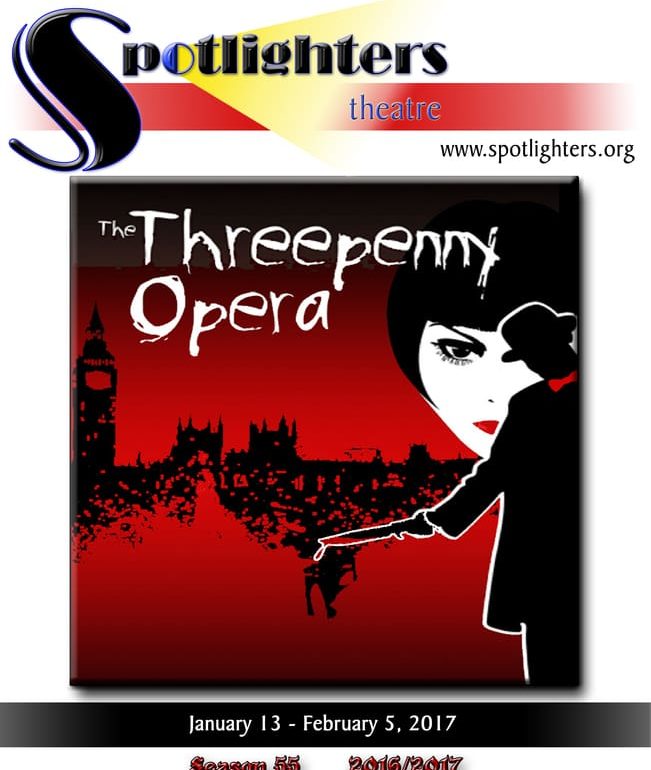The line forms, on the right, babe— now that Macheath is back in town! The Audrey Herman Spotlighters Theatre is sending scarlet billowing all over the stage, kicking off 2017 with a flash of those pearly white sharks teeth as they bring the iconic Bertolt Brecht adaptation, The Three Penny Opera to the stage. Directed (with new editing, adapting, and translating) by Michael Blum with Musical Direction by Erica Rome, this poor man’s opera is certain to put the tingles up your spine. With music by Kurt Weill, Brecht has adapted Elizabeth Hauptmann’s translation of The Beggar’s Opera by Jonathan Gay into a tawdry tale all its own for the stage. So fantastical only a beggar could have imagined it, yet cheap enough that a beggar can still afford it— that’s exactly what is happening in the uniquely intimate postage-stamps square staging this winter at Spotlighters.
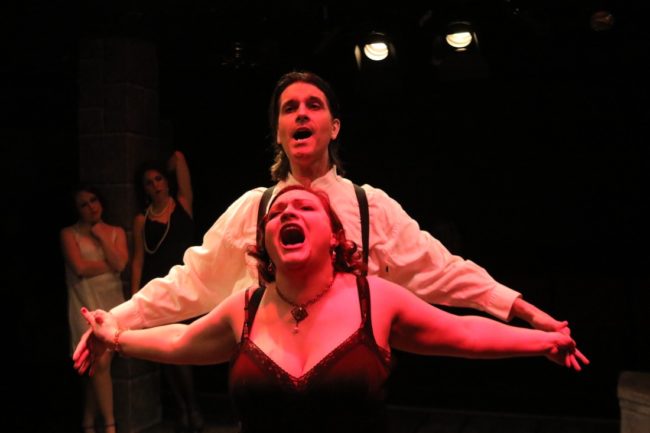
Now on the sidewalk, well the floors anyway, lies a simple glossy coat of sheen to keep the aesthetic looking polished but not too pristine, since this is after all a beggar’s opera. Resident Scenic Artist Alan Zemla shifts the focus to where it ought to be, the performances. Leaving the walls rather ordinary and letting the performers tell the story, Zemla’s unobtrusive set design is functional without a lot of frills or fuss. This too is the vein of approach for Lighting Designer Al Ramer. Nothing melodramatic, nothing over-the-top, though a bit of red here and there to emphasize a point as sharp as Mack’s knife. Both of these simplistic approaches are not only inherent to the script but necessary to allow the beauty of the music and the story to really radiate in all of its resplendence.
Fancy gloves, oh, wears the— actually, the only person in the production notably wearing gloves is Macheath, but Costume Designers Amy Weimer and Darcy Elliott set the fashion bar high with their sartorial selections. Weimer and Elliott infuse a sense of dignified class into the mobster aesthetic while simultaneously brushing a brazen coat of seedy lust into the costumes for the whores. Weimer and Elliott work together to craft a unified aesthetic that helps to ground the production in its own reality. Macheath’s costume in particular is seductive and swarthy, a rich tapestry that carries so much of his personality outward so that the audience can experience it.
While there is little dancing to be spoke of in this production (or perhaps any production) of Three Penny Opera, Choreographer Melissa McGinley puts a skosh of flare into the notable dance routine, which occurs between Macheath and Jenny Diver. There is a sensual seduction in this tango, featured at the end of the first act in “Pimp’s Ballad (Tango Ballad).” The way McGinley works this dance routine fully encapsulates the sinful nature of their relationship and involvement and moves flawlessly to the rhythm and tempo of the music.
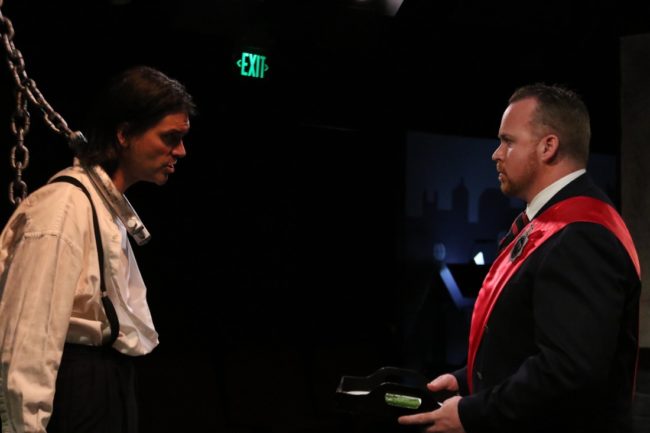
The directorial framework that Michael Blum has applied to the show is quite striking. His bookended concept of starting the show on the modern impoverished streets of America is deeply profound and ultimately relatable to the world in which we live. Having the company dressed as the homeless beggars of modern day America in their rags with their signs draws parallels to what happens in the production and having these performers leave their characters behind at show’s end and don once more this derelict persona is the perfect way to wrap this concept fully around the performance.
Blum’s overall approach to the production is solid, pacing being tight despite the production’s natural length, which is quite long by modern performance standards. The show moves swiftly from scene to scene, complimented exceptionally by strategically placed musical vamps (provided skillfully by Musical Director Erica Rome) played over the transitions. The production itself, in terms of fluidity and overall execution lacks artifice and overall is blemish free. A few of the casting choices feel somewhat unsettling, where more minor and cameo characters outperform leads, but this doesn’t upset the overall balance of the production. The group presence and sound of the ensemble is a strong one, charged with energy to carry the audience through the three-hour epic.
Musical Director Erica Rome and her lone pit-partner William Georg make musical magic over the course of the production with just one keyboard, a synthesizer, and percussive options. Rome’s keen understanding of the score and how to make adjustments accordingly is the theatrical glue that not only bonds the production to itself but also serves as a slick lubrication to keep the performance moving smoothly. Georg, who replicates the sound of a squeezebox at various moments throughout the performance on his synthesizer, adds an air of theatricality to the production, which Rome authenticates with her precision timing keeping the actors on top of their numbers. The pair works exceptionally well together to craft honest sounds with exacting detail and nuance from the score that easily carries the potential to be lost or entirely dismissed.
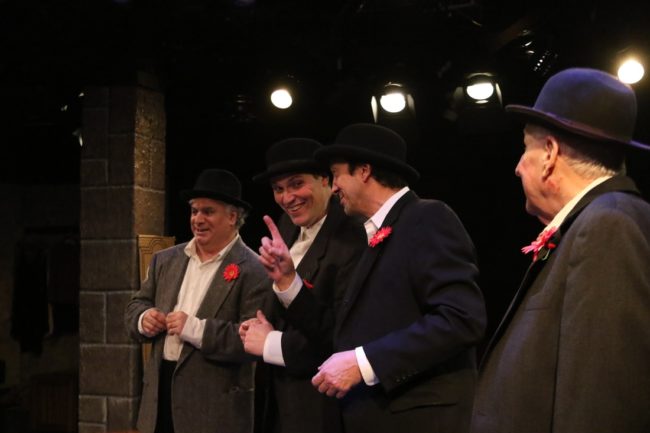
Robust sounds radiate from the ensemble as a whole every time they take to chorusing together. This is heard most heartily in the finale moments and in the haunting “What Keeps Mankind Alive?” though the song is shared by soloist performance dotted liberally throughout. The whores (Amie Bell, Andrea Bush, Kristin Miller, Rachel Verhaaren) put quite a sound together for “Turn Off the Lights” as well. This is another moment where hints of McGinley’s choreography is given a moment so shine, with simple circle steps from the aforementioned ladies of the night.
Boisterous and bold, Macheath’s gang— lead by Crook-fingered Jake (Jim Knost)— puts up quite a vocal effort when it comes to their singing and carousing. Comprising the other three members of the gang, Glen Charlow, Dave Guy, and Stuart Kazanow each ring a quirky personality to this quartet of derelicts. Kazanow may be the most memorable as far as characters go with his quick temper and cheeky phraseology, though it’s Knost’s voice— in addition to his absurdly oblivious behavior in the scene where Macheath is hauled off— that swells up into the lighting grid for numbers like “Wedding Song for Poor People” and “The Cannon Song.” The latter of the two features the warm and welcoming voice of Tiger Brown (Robert Wall), providing a good vocal foil to Macheath himself. Wall, like the other men of the production finds a niche that works for his character and sticks to it, making Tiger Brown a sympathetic character, if not an enjoyed one.

There is something bland about Polly Peachum (Allison Hicks) but it is difficult to say what. The chemistry between Hicks and Macheath (Steve Quintilian) feels disconnected in places, as if they are both reaching toward one another but simultaneously missing in opposite directions. Hicks is fair of voice, however, and what she lacks in character work more than makes up for when she sings “Bill’s Beerhall in Bilbao” a raunchy and wildly entertaining number with the gang. Her voice is dulcet and sublime for “Barbara’s Song” but it’s the duet she shares with Miss Lucy Brown (Amber Hooper) that gives her vocal ability a chance to radiate. Hooper, who has the more operatic soprano range of the pair, leads “Jealousy Duet” with a ferocious snarl that carries well the weight of her character’s agony. Hooper, who has her own solo later in the second act, “Lucy’s Aria (The Poisoning Song” showcases her vocal prowess here, making her a most impressive performer, second only to the strikingly stunning vocal performance given by Jenny Diver (Evangeline Ridgaway.)
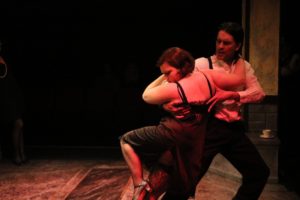
Gusto, finesse, emotional angst, and a powerful instrument that could easily blast back the walls of Spotlighters’ intimately confined staging, Ridgaway is the perfect fit for Jenny Diver. Her initial solo, “Pirate Jenny” is gritty and fierce, giving audiences a taste of what’s to come with both her character work and her vocal abilities. This number gives Ridgaway a rare opportunity to dominate the stage as she stands there clawing her way through the solo as the only person on the stage and the effect is not only striking but deeply moving. “Solomon Song” and its reprise are harrowing, possessed of a striking and haunting beauty which Ridgaway grounds into the character’s rich emotional depths. Ridgaway presents a rich versatility in the Judas-style role, giving the audience a fully satisfying emotional gamut when it comes to the character of Jenny Diver.
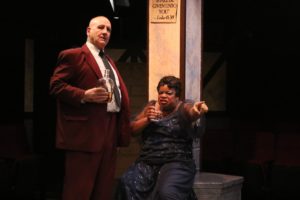
So too of the fully developed character nature comes mean man Jonathan Jeremiah Peachum (Frank Mancino), proprietor of “The Beggar’s Best Friend.” Ruthless, cynical, cold, and unruly of civil mannerism, Mancino creates a delectably vile villain inside his characterization of Mr. Peachum. With an instrument that fully supports these nefarious character choices, Mancino does numbers like “Wake-Up Song” and the duet, “Instead-Of Song” a great justice. The latter is a song shared with Mrs. Peachum (Kay-Megan Washington) who manages to hold her own against the bristling and caustic knave. Washington delivers a firm personality that bubbles with comedic relief where applicable, but is no stranger to staunch vocal work, as evidenced in her performance of “The Ballad of Sex Addiction” and its reprise.
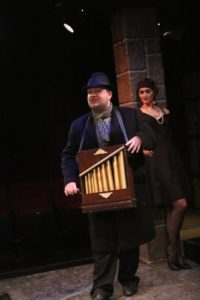
Completely outside of the narrative, Connor Moore’s character of the Street Singer is remarkably well conceptualized and his voice is a warm balm to the iconic number, “Moritat” better known as The Ballad of Mack the Knife. Mirroring Sinatra in enthusiasm and unction when it comes to this song, Moore is a lovely liniment on the ear and paints a vibrant pictures with all of the well-penned lyrics resting inside the number. Doubling and tripling up as a street beggar named Charles Filch, the drunkard Reverend Kimball and the mounted messenger at play’s end, Moore has his work cut out for him but manages to make each of these characters distinctly unique— with the exception of the Mounted Messenger, who bleeds immediately into the Street Singer, drawing forth the close to the narrative and allowing the book-end framework Blum has placed on the show to conclude in a natural fashion.
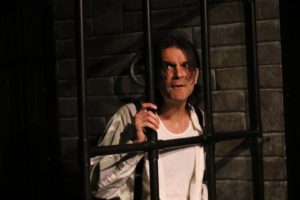
There’s someone sneaking round the corner, could it be Mack the Knife? Captain Macheath, played by Steve Quintilian, comes with a world of expectations as the role is infamous. Quintilian takes a rather subdued approach to the character and some of the great visceral edge that is often anticipated is lacking from his portrayal. This, however, does not upset the balance of the way he has constructed his overall performance. A subtler, quieter, more aloof and jaded Macheath is what the audience receives in watching Quintilian’s performance and it’s not unpleasant. His voice, though not the strongest, is well suited for the range and grows exponentially in emotional expressivity as the play progresses through the final moments, particularly “Call From the Grave” and “Epitaph.”
As we said, the line forms— to the right, dear! Now that Macheath is back in town. But he won’t stay in town long. Get your tickets to witness this cleverly constructed streetwise opera of sorts and you shan’t be disappointed.
Running Time: 3 hours with one intermission
The Three Penny Opera plays through February 5, 2017 at The Audrey Herman Spotlighters Theatre— 817 St. Paul Street in the historic Mount Vernon neighborhood of Baltimore City in Maryland. For tickets call the box office at (410) 752-1225 or purchase them online.

